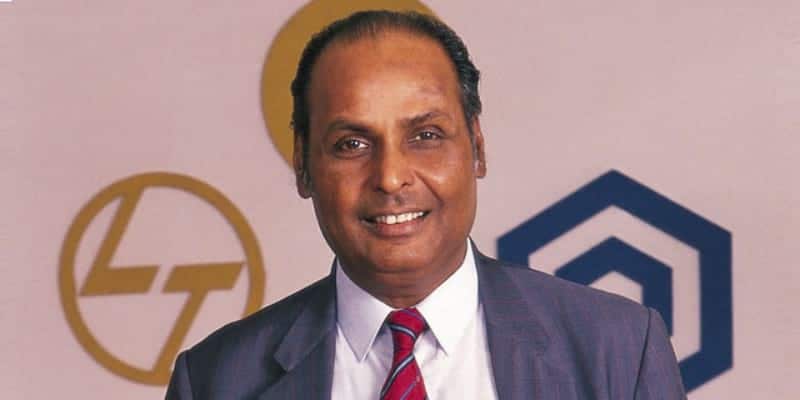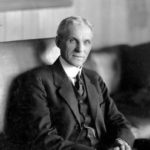Dhirubhai Ambani life story and net worth

Dhirubhai Ambani (December 28, 1932 – July 6, 2002) was an Indian businessman and industrialist. Dhirubhai Ambani was the founder of Reliance Industries, a large conglomerate in the petrochemical, communications, energy and textile sectors. The company was the first private company from India to make the Fortune 500. After his death, the company was worth $2.9 billion.
This article covers Dhirubhai Ambani’s story of success, from early youth until his death. You will also find some of his inspiring quotes here. Enjoy the read!
Dhirubhai Ambani biography and life story
Youth
Dhirubhai was born in the small village of Chorwad, in the western Indian province of Gujarat. He is from the same region and tribe as Mahatma Gandhi. His father was Hirachand Govardhandas Ambani. He was a teacher in the village and did not earn much money. He lived a simple life with Dhirubhai’s mother, Jamanaben.
Dhirubhai had two sisters and two brothers: Trilochanaben, Jasuben, Natubhai and Ramnikbhai. It is customary in the region where he was born to add ‘ben’ to female names, which means sister. Brother is added to male names: bhai. Although Dhirubhai was a troublesome child, he seemed to have been the favorite child of the family.
He was a demanding child who was difficult to please. Terms used to describe his character and personality include: powerful, unyielding, intelligent, robust and unstoppable. Dhirubhai was an energetic child and very enthusiastic about whatever was on his mind, determined to do what he wanted to do in his own way.
Teen years
Dhirubhai’s difficult nature was also noticeable in school. He did not come into his own in the oppressive mill of education, he himself also concluded early on. If he could choose what to do, he always chose strenuous physical activities.
Jamanaben urged the brothers Dhirubhai and Ramnikbhai to supplement their father’s income by earning some money. She kept pushing for it until Dhirubhai got angry about it. He snapped at her that he would make a lot of money later, and why she kept nagging for money.
To back up his words, he bought a can of peanut oil with a loan and sold the oil by the side of the road. He gave the profit he earned from this to his mother. Thereafter, in his spare time, he started setting up market stalls selling French fries and fried onions.
Secondary education
After Dhirubhai completed the fifth standard in the Indian school system, he went to the city of Junagarh. Here he developed his strong verbal insight and was praised for his organizational skills and team spirit. He was not strong in the exams and other routine tests, but did well on average in his final exam. Mathematics was difficult for him to pass.
In his third year of schooling, he was chosen as the general secretary of the Junagarh Students Union. He was an important figure in the class and had organized several activities in previous years. For example, he took his classmates to the top of Girnar Hills and went to the Gir forest to spot lions.
Independence India
During this school period, Junagarh was a princely state under the rule of the Nawab, a Muslim family. The Nawab family was required to merge the state with the Indian Union after the Indian Independence Act was passed, but declined to do so. As a result, on August 15, 1947, when India celebrated its independence, the people in the Principality of Nawab were still shackled. They were not allowed to celebrate independence and were even told to stay indoors.
Dhirubhai Ambani ignored the ordinance and decided to convene the students of his school and perform a flag ceremony with great fuss. They sang patriotic songs and handed out candy. Here he gave his first short speech, which was described as passionate and thundering.
Dhirubhai was detained but they decided not to make him responsible for the offense, given his young age. They wanted him to plead not guilty, he was told during hours of interrogation. Dhirubhai did not give in and refused to plead innocent. Still, he was sent away later that night. He received a hero’s welcome from his schoolmates.
Praja Mandal
Resistance grew in the region and Dhirubhai decided to join the Praja Mandal movement. He made posters in secret hideouts and distributed illegal newspapers and flyers with his school bag. At one point the pressure from the population was so great that the Nawab fled. Soon after, Junagarh joined the Indian Union.
Later, Dhirubhai Ambani said that it was one of the most exciting days of his life.
Political ambitions of Dhirubhai Ambani
Shortly after this event, a new student movement was established in the city. Dhirubhai again became the leader, which eventually caught the attention of the local political leaders. He was very attracted to politics because it was a way to contribute to the development of a new India.
When the municipal elections were held in Junagarh, Dhirubhai Ambani decided to campaign for the socialists, who had recently split from the congress. He was attracted to political figures like Jawaharlal Nehru and Sardar Patel.
His father and older brother strongly opposed his participation in the campaign, partly because he had failed the entrance exam in school. Dhirubhai reassured them by saying that he would pass the exam next time, despite his participation in the campaign.
The candidates Dhirubhai had campaigned for won and he was delirious. He was immediately invited to join the Socialist Party. However, he felt he belonged elsewhere and kindly declined the invitation.
Early career
Even before the results of his entrance exam became known, his father called him to him. Dhirubhai Ambani indicated that he could no longer work due to his deteriorating health and that Dhirubhai would no longer be able to study, but that he was needed to help earn money. Dhirubhai replied that he would do what was expected of him. Ramnikbhai had already secured a job in Aden.
Arriving in Aden, Dhirubhai started working as a clerk at A. Besse & Co. It dealt with books: handling, shipping, forwarding and selling. Dhirubhai Ambani was first put to work in the trading department of the company. Later he was transferred to the department that processed petroleum products for Shell.
During this period he learned to do business. He was quick to deal with and had a knack for doing business. He met traders from all over the world and surrounded himself with influential figures. He was tempted to trade in the market, but had no money for it. He decided to work for free for an accounting company, to gain more insight into the financial world.
Trading on the market
Once he thought he was ready, he started to trade on buying and selling all kinds of goods. Dhirubhai Ambani borrowed money from friends and family and his motto became: profit I share and all loss is mine. Soon people discovered that he had a knack for making market speculations.
Meanwhile, Shell’s oil refinery came to Aden, in 1954. The same year, Dhirubhai returned to Gujarat to marry Kokilaben. He got a new job at the oil filling station in the new port. He liked the job, but it was more demanding than his previous jobs. During this period, he started dreaming about building his own refinery.
Dhirubhai’s father had died in 1952. He had since been blessed with a son, Mukesh D. Ambani. He considered opening a shop in London and living a good life, but couldn’t make the choice to miss out on India’s growth and development.
Dhirubhai was then 26 years old.
Bombay
In 1958 he arrived in Bombay, without a significant amount of money and without connections. With his small wallet, Dhirubhai Ambani began to look for business opportunities. He came to the conclusion that he could only start a small shop with his money, but that was not what he was looking for.
He settled in Bombay and started Ambani Reliance Commercial Corporation, a spice trading company. All that was in the office were two chairs, a writing pad, pens and an inkwell. There was no telephone, but he was able to make and receive calls on a nearby doctor’s phone. He paid the man a fixed small amount for every telephone use.
He hired a handyman and an old man. The old man was engaged in letter writing and reception work. Dhirubhai Ambani began sending Arabic letters to his contacts in Aden and the Gulf Emirates outlining the rates at which he could deliver spices.
The orders started trickling in and were quickly fulfilled. He kept margins low, quality and volumes high. He was one of the few to do so and quickly made a name for himself. When he received complaints about the quality, he waived the clients’ obligation to pay.
One day he received a large order for fertilizer from the Gulf Emirates. His friends and employees told him that it was impossible to collect so much manure in such a short period of time. Dhirubhai liked a challenge and accepted the assignment. He later admitted that they “really made a lot of money” with this assignment.
Textile
After a few years, the excitement of working in the spice sector eased. He was told that there was also a lot of money to be made in the textile industry. The industry was complex and highly speculative, dominated by companies such as Forbes & Gokak, companies that had long been active in the industry.
Dhirubhai Ambani started visiting yarn markets and observed how the trade worked. He started buying and selling various yarns. First in small quantities, then in larger quantities.
The company grew, so his need for money also grew. He began lending money at high interest rates, solving this deficiency. He started making big deals in yarn and moved into a bigger office. His brothers also came to work for the company.
The company was plagued by false rumors, such as the rumor that Dharubhai would be bankrupt. Later on, events like this would happen even more often. He describes it as the fire of envy.
Shortly afterwards, Dhirubhai was elected director of the Bombay Yarn Merchants Association. The company became known for Bamber, a type of textile that had a distinct sheen and was well suited for making saris and clothing materials. These fabrics lasted longer than nylon. With the domination of this new hype, the first large flow of money came for the later Reliance Industries Textiles.
During the years 1958-1965, the company continued to grow and more and more people joined Dharubhai. He ran the company in a friendly and flexible manner. He showed understanding for human shortcomings and went out of his way to help anyone who needed it. No wonder most of the employees were very loyal to him.
His family also expanded. Mukesh was now 9 years old and he had a second son, Anil Ambani in 1959. He also had two daughters in 1961 and 1962. In the meantime, the family had moved to a larger apartment in the south of Bombay.
Setbacks
He decided to build his own textile factory, instead of buying an old one. He sent his brothers to find a suitable location. They found it near the textile city of Ahmedabad in Naroda.
Dharubhai described this adventure as a big dream for everyone involved. The project started with six people in 1966. Construction started in May that year and went on day and night. Sen Gupta put together four Liba warp knitting machines and a Then dye machine. A stenter machine was also ordered.
On June 6, the rupee suddenly devalued by nearly 37 percent. The government immediately ended several financial schemes, including for the export of nylon. Despite objections, construction went ahead and the deadline of September was just met.
Production of the fabrics began in January 1967, but the newly unrolled fabric continued to pile up in Reliance’s warehouses due to opposing wholesalers. Dhirubhai decided to go directly to the retailer investors. He supplied large quantities of material without demanding payment obligations. His approach worked.
Many retailers stopped selling other brands and slowly the slogan ‘Only Vimal’ arose. The Vimal fabrics were named after Vimal Ambani, Dhirubhai’s nephew and son of Dhirubhai’s elder brother Ramniklal, who still serves as the oldest member on the Reliance board.
Business was going well and Reliance and Naroda continued to expand. In 1980 there was another expansion with the installation of 148 Sulzer looms, 16 Sourer looms and a large number of machines for applying texture to textiles.
In 1983, son Anil Ambani came back to India after receiving his MBA from Wharton School in Pennsylvania, United States. He married Tina Ambani, a well-known actress.
He joined Reliance Group as co-chief. The company developed and innovated, adding fully automated weaving machines and other high-quality textile machines until 1996. Reliance became the largest composite company in the country, where everything was done to turn raw yarns into large finished bales of fabric. The company also started producing high quality materials, including upholstery fabrics and camel wool.
The Death of Ambani
Dharubhai suffered a serious stroke in 2002 and was admitted to Breach Candy Hospital in Mumbai. He was in a coma for over a week and several doctors were consulted. He passed away on July 6, 2002. He received the Padma Vibhushan award after his death.
Net Worth of Dhirubhai Ambani
Reliance Industries was the first private company from India to make the Fortune 500. After his death in 2002, the company was worth $2.9 billion. At that time, Dhirubhai Ambani was ranked by Forbes as the world’s 138th-richest person.
Dhirubhai Ambani quotes
- “We bet on people.”
- “Meeting the deadlines is not good enough, beating the deadlines is my expectation.”
- “Pursue your goals even in the face of difficulties, and convert advertisements into opportunities.”
- “Don’t give up, courage is my conviction.”
- “Between my past, the present and the future, there is one common factor: Relationship and Trust. This is the foundation of our growth.”
- “Only when you dream it you can do it.”
- “Think big, think fast, think ahead. Ideas are no one’s monopoly.”
- “Our dreams have to be bigger. Our ambitions higher. Our commitment deeper. And our efforts greater. This is my dream for Reliance and for India.”
- “You don’t require an invitation to make profits.”
- “If you work with determination and with perfection, success will follow.”
- “Pursue your goals even in the face of difficulties, and convert advertisements into opportunities.”
- “Give the youth a proper environment. Motivate them. Extend them the support they need. Each one of them has infinite source of energy. They will deliver.”
How to cite this article:
Janse, B. (2022). Dhirubhai Ambani. Retrieved [insert date] from Toolshero: https://www.toolshero.com/toolsheroes/dhirubhai-ambani/
Original publication date: 02/28/2022 | Last update: 05/24/2023
Add a link to this page on your website:
<a href=”https://www.toolshero.com/toolsheroes/dhirubhai-ambani/”>Toolshero: Dhirubhai Ambani</a>











